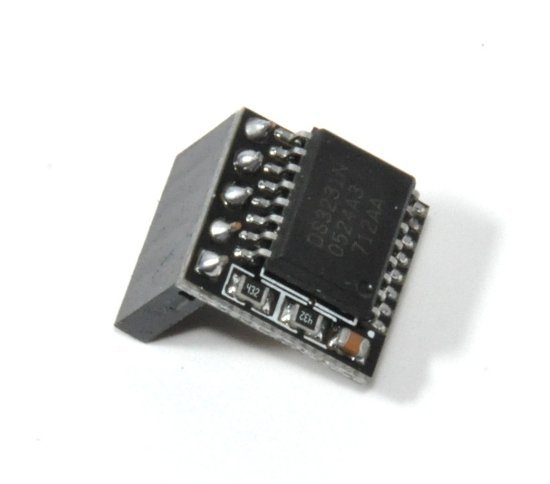-
• #2
oh here it is, my module

values on these tiny resistors are 432 = 4,3k so it's even worse..
and here is my solution (10k resistors soldered):
1 Attachment
-
• #3
Nice - thanks for the post (it's a nice looking little module!).
I'd really have thought that 4k resistors would work - the STM32 shouldn't be that picky. Perhaps it was something wrong with the resistors that came on the board itself?
-
• #5
Often the I2C master [here, the stm32] is strong enough to force a line to 0V through a 4k7 resistor. I bet the problem here is the RTC itself which should probably have weak output drivers unable to push the lines to zero Volts (thus, very low current drained which is a good point for a RTC in term of power consumption).
-
• #6
Good point about the device on the end! I hadn't considered that.
Yes, the STM32 will push out 20mA or so per pin, so should easily be able to handle 1k or less - but the RTC itself is probably built for low power consumption so won't have powerful output drivers.
-
• #7
I haven't thought about it that way, good point
as I found, these tiny rtc modules are designed to work with Raspberry Pi (https://goo.gl/hwqD8I) moreover they all have soldered 4.3k pull-ups, I dont think they all manufactured broken with wrong pull up value.
I suspect 4,7k is okay for stm32 but anything below (like 4,3k) is not
 ancienthero
ancienthero Gordon
Gordon Jean-Philippe_Rey
Jean-Philippe_Rey
after 2days battle with the DS3231 RTC I want to share my thoughts
If you get this kind of error
It's most likely because I2C pull-up resistor value is too low, it should be 10k not 4,7k
4,7k is a default pull-up value in many schematics but it's not enough for stm32, of course in many cases 4,7k would do the job but if you want to avoid hazards always pull-up 10k on I2c.
In my case, a cheap DS3231 module had soldered 4,7k resistors, funny enough it was working on a breadboard but not on my custom made PCB lol....